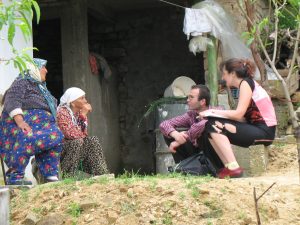The International Center for Minority Studies and Intercultural Relations (IMIR) was founded in April 1992 in cooperation with the Center for the Study of Islam and Christian – Muslim Relations (CSIC), Birmingham, UK and the Center for Research in Ethnic Relations (CRER), Warwick, UK. IMIR is a private, non-political, non-profit and non-governmental organization. IMIR is dedicated to the values of peaceful coexistence and tolerant interaction between different cultures, ethnoses and religions in Southeastern Europe and actively works for preservation and integration of all minority communities in Bulgaria.
In the first years of its existence and especially during the period of the worst economic crisis in Bulgaria (1996-1997), the humanitarian work was equally important segment of IMIR’s activities as was the research and scientific work. In the years after the crisis, IMIR continued to work as a donor institution, assisting various minority communities in Bulgaria through its scholarship program, its support for minority media and its support for research programs dealing with minorities. In the recent years, IMIR has gradually downsized its donor activity, thus turning into a genuine think-tank, fully devoted to production of expert research, analyses, forecasts and policy recommendations.
IMIR works with some of the best Bulgarian experts on issues like minority rights, minority integration, migrations, human trafficking, Islam, and inter-ethnic and inter-religious relations. Relying on the intellectual potential, integrity and dedication of these experts, IMIR has earned national and international recognition for its academic research, and for its studies of interethnic and religious issues in Bulgaria and the wider Balkan region. The Center has always been active in stimulating the inter-Balkan relations and the regional cooperation, and has established a number of partnerships with academic and non-governmental organizations not just in Bulgaria and other Southeast European countries, but across Europe.
URGENT ANTHROPOLOGY – IMIR’S TRADEMARK
The method of Urgent Anthropology, developed by Antonina Zhelyazkova, the Chair of IMIR’s Board of Directors, has become one of the most important IMIR’s trademarks. By sending multi-disciplinary research teams into the heart of the Balkan conflict zones such as Kosovo, Macedonia, Bosnia-Herzegovina and southern Serbia in the most critical times (during or immediately after the eruption of crises), IMIR has received international praise for its timely, accurate and impartial analyses of the regional hot-spots. The result of this work was the highly acclaimed Urgent Anthropology book series.
THE MAIN OBJECTIVES OF IMIR ARE:
To study the inter-religious and inter-ethnic issues in Bulgaria, in the Balkans, and the Mediterranean region, and to analyze the zones of compatibility and incompatibility between Islam and Christianity.
To disseminate the knowledge about the ethnic, religious, cultural and linguistic minorities, as this is the only way to overcome xenophobia and to cultivate mutual confidence and understanding.
To work for the peace and peaceful coexistence of various ethnic and religious communities in Bulgaria and in the Balkans and to promote tolerance and equality among all the ethnic and religious communities.
To contribute to the creation of open society in the Balkans in order to overcome the prejudices towards the “internal others” – the minorities, and the “external others” – the Balkan neighbors.
To combat discrimination towards the minorities in order to secure social, cultural and political inclusion of minorities.
IMIR’S FIELDS OF INTEREST
The following fields are the main focus of IMIR’s research:
STUDIES OF ISLAM
IMIR works with the best regional specialists on Islam and the Arab world and their experience and knowledge is of exceptional value for the understanding of complex issues, related to the conflicts in Middle East and with international terrorism. IMIR’s outstanding achievements in this field were recognized long ago. The landmark work in the field are eight volumes of IMIR’s series The Fate of Muslim Communities in the Balkans. The books from this series are in great demand among the students, academics, researchers, etc. The current tensions in the relations between Christians and Muslims have made our specialists some of the most sought after experts in the country and their opinion is demanded both by politicians and the media. IMIR is producing some of the most precise forecasts for possible inter-ethnic and religious tensions on the Balkans and studies on the state of the Muslim communities in the region.
MIGRATIONS
In recent years, IMIR has conducted extensive research of emigration patterns of Bulgarian citizens, especially those of minority ethnic origin. IMIR is also studying the communities of immigrants, settling permanently in Bulgaria (Arabs, Kurds, Chinese, Vietnamese, and nationals of various African countries). The Center has also started a research on trafficking of women and children from, through and to Southeast European countries.
BALKAN TENSION ZONES
IMIR will continue with its fieldwork and researches in those parts of the Balkan peninsula, characterized by inter-ethnic and religious tensions. Thus IMIR will try to live up to its reputation as an organization, producing the best research, analyses and policy recommendations in regard with the potential and actual conflict zones in the Balkans.
EDUCATION OF MINORITY COMMUNITIES / MULTI-CULTURAL EDUCATION
IMIR’s work in the sphere of education has lead to the breaking up of conservatism and prejudices and helped the establishment of a new, growing and increasingly vocal intellectual elite within the minority communities. Bulgarian government is looking more and more often to IMIR and other NGOs for advice and experience in dealing with the reintegration of minorities into the education system. IMIR’s successful work with the education of children and youth from Turkish and Bulgarian Muslim communities could and should be developed and adapted to the needs of the Roma community, where the issue of education is the most critical. IMIR’s long-term work with the Roma community is of exceptional importance for the efforts for the full integration of Roma into the Bulgarian society. IMIR has conducted a number of studies on topics like employment and education problems of Roma in Bulgaria, which served for the preparation of relevant government’s policies.
PUBLISHING ACTIVITY
IMIR plans to develop and improve on its publishing activity. Due to the limited funds, IMIR’s books, which are usually based on the research conducted by the Center, were usually printed in small circulation and only in Bulgarian language, which seriously limited the distribution outside the country. IMIR is currently working on several possibilities for obtaining additional funding for translation, which would significantly increase the effect of IMIR’s work abroad.
CONTACT:
For more information contact Marko Hajdinjak at marko@imir-bg.org
Sofia 1303, 55 Antim I St.
Tel: (+359 2) 8323112, 8324044
Tel/fax: (+359 2) 9310-583


